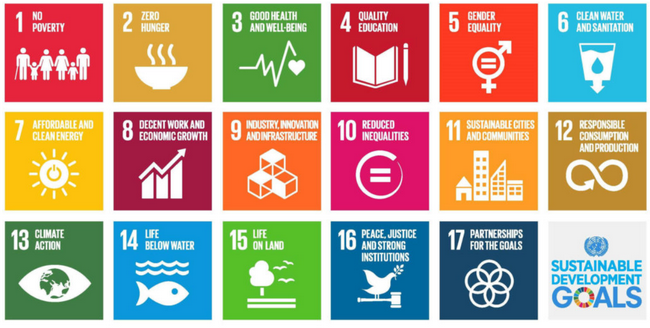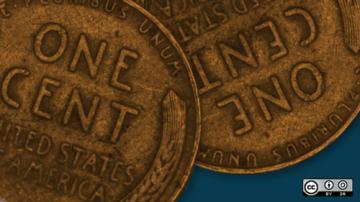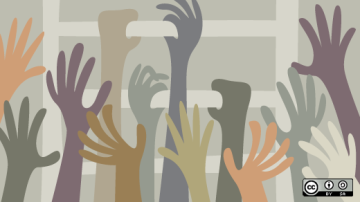In the first part of this extended review of The Age of Sustainable Development" by Jeffrey Sachs, I outlined the author's argument about the environmental impacts of economic development. In the second article, I discussed the author's argument about impacts on humans. In this final piece, I will discuss how to address those impacts. I'll outline Sachs' suggestions but will also further explain how taking an open organizational approach to the issues will be critical to addressing them.
Simply making these problems transparent will not solve them, but it is a good first step. That's where effective governance through open organization principles enter in. According to Sachs, good governance is essential to fostering sustainable economic development, and we will build it through institutions 1) taking accountability, 2) being transparent in their behavior, 3) participating globally, 4) believing that polluters should pay for their damage, and 5) being committed to solving these issues.
To address these concerns, there must be a way to measure critical environmental and health issues and install dedicated governance to address them. Among these issues are health care and education, infrastructure (such as roads, ports, and power), crime and violence issues, basic science and new technology development, and regulations to protect the environment.
Once concerns are identified, global governance can help to spark collaboration within and between communities to find detailed, local solutions. Institutions will help adapt strategies to each region worldwide from the outset of the work and while it's in progress. Simply put, this article will address governing and encouraging action to do something about sustainable economic development. That will require open organization facilitators and leaders.
Help wanted: Salespeople for sustainability
Whether we're addressing humanitarian concerns or environmental ones, we'll need people advocating for open approaches to more sustainable economic development processes, and those people must have the global reputation necessary for motivating an international community—which will then influence each national community, right down to each neighborhood. Here are just a few examples:
- At a national level: U.S. Special Presidential Envoy for Climate, John Kerry. Why would a former Secretary of State in the United States be selected to discuss climate concerns? Because he must strongly convince the entire world that climate change is a real and present threat, and that a sustainable economic development program must be executed globally. Also, Gina McCarthy is now the United States National Climate Advisor, working to promote the reduction of the emission of greenhouse gases.
- At a global corporate level: Klaus Shwab at the World Economic Forum is addressing these issues. At each yearly gathering, he and his organization are making more transparent the ways that corporations are participating in both environmental destruction and human hardship issues. Shwab believes more corporations should take responsibility for addressing these issues.
- At a global youth level: Younger populations specifically will be most impacted by climate change, and activists like Greta Thunberg are encouraging the international community to get more involved in tackling climate change. To help them get communities involved and build public awareness, information and communication technology specialists could further help through data gathering, analytics, telecommunications and social media. (Want to talk more about these issues? Come chat with our community.)
- The Paris climate accord and agreement. Governance begins with people coming together to address issues, and the 196 countries gathering for the United Nations Framework Convention on Climate Change (UNFCCC) was a good start. Each country sets its own targets to help reduce global warming. Countries can cooperate and collaborate on their strengths. Every five years each country must be vividly transparent regarding its goal achievements and shortfalls. If they're honest and open with not only what they've achieved but what they've struggled with, greater cooperation and collaboration could result. Each country must be inclusive when it comes to reaching out for help in achieving its targets. The Sustainable Development Knowledge Platform is trying to develop a "paint by the numbers" approach with a handbook to help reach national targets.
Combating extreme poverty
According to World Bank data, between 1981 and 2010 China and India dramatically reduced extreme poverty in their huge countries. Open Organization principles of inclusivity, transparency, and collaboration have underpinned efforts from both countries. Armed with their experience, the global community will need their help and support on this issue. Conversely, sub-Saharan Africa has not been successful in reducing poverty levels. That area will need help, as institutions don't have the resources to tackle this issue alone, as Sachs details in The Age of Sustainable Development. According to Sachs, extreme poverty can be overcome in our lifetime; once overcome, tackling the effects of economic development could become easier. But to achieve this, governments, businesses, communities, neighborhoods, families, faith groups, academicians, and individuals must collaborate and play a role. For example, the Council of Europe is using open organization principles in their work building awareness of extreme poverty (see the "World Day to Overcome Extreme Poverty" on October 17, 2021). Also, one of the United Nations Sustainable Development Goals (SDG) is the elimination of poverty; see the End Poverty campaign.
Building solutions together
Whether we're talking about human suffering or ecological and environmental issues, problems will always arise. These problems are so large that single countries or local communities can't solve them alone. They need help.
Sachs knows this. Under the direction of the UN Secretary General Ban Ki-moon, he was commissioned to develop a support network. It's called the Sustainable Development Solutions Network (SDSN), a network of hundreds of universities around the world that partner with governments, businesses, and nongovernmental organizations. This is one of the situations in which transparency (expose problems), inclusivity (find outsiders for support), collaboration (discuss the situation and potential solutions) and adaptability (help these countries adapt to new processes and break loose from current destructive processes) become important.
As I mentioned at the beginning of this series, the open organization principle of transparency is extremely important in combating these problems, and information and communication technology specialists could be helpful even on a volunteer basis. Future environmental damage must be exposed, demonstrated, and dramatized to promote both funding and action to counter the destruction of the planet and loss of life.
This is what the UN Millennium Development Goals (MDGs) tried to address starting in 2000 and ending in 2016. According to Sachs, the initiative saw some successes:
- They did start the process of mobilizing society on these issues.
- They began the process of creating peer pressure to improve within the global community.
- They started to assemble experts in each field.
- They started to inclusively mobilize community leaders, politicians, government ministries, international organizations and philanthropic organizations toward collaboration on each issue together.
- The goals were made specific, quantifiable and measurable, which enabled more transparency, so strategic plans could be developed, monitored, measured and evaluated.
According to Sachs, however, there were problems with the MDGs:
- Funding for several goals, like fresh water supply and sanitation (SDG#6), was poor.
- Some goals were not transparent, so no action plans were developed.
- Many politicians did not support some issues.
From what collaborators learned from working on the MDGs, a new set of goals was determined. They are the Sustainable Development Goals (SDGs), which I mentioned in earlier articles (see Figure 1).

Figure 1: The UN Sustainable Development Goals
I mentioned that once goals are set, we can start collaboration within and between communities to find solutions. The Sustainable Development Goals contain clear and specific objectives. Let me review a few and discuss how open organization principles should play a role in them.
Open and sustainable governance
There are 17 SDGs. Each has an "Overview." Each is further broken down into "Targets and Indicators," and each lists a "Progress and Info" report, so readers learn whether goals are being reached.
For example:
SDG 1: No extreme poverty
SDG Target 1.1: "By 2030, eradicate extreme poverty for all people everywhere, currently measured as people living on less than $1.25 a day"
Indicator 1.1.1: "Proportion of population below the international poverty line, by sex, age, employment status and geographical location (urban/rural)"
Consider China's war on extreme poverty. China is developing some interesting, successful strategies in this area, and could play a more prominent role in assisting globally.
Also:
SDG 7: Affordable and clean energy
SDG Target 7.1: "By 2030, ensure universal access to affordable, reliable and modern energy services"
Indicator 7.1.1: "Proportion of population with access to electricity"
In The Age of Sustainable Development, Sachs suggests potential energy sources for every region of the world. Depending on the environment and climate, for example, perhaps solar power generation would be suitable. In other regions, wind power would be best. In still others, nuclear power would be ideal. Sachs notes that global communities must continue to work on reducing the cost of energy. With commitments from governments around the world, global energy specialists could start collaborating to fill future energy source demand. In addition, we need to examine energy waste. As I mentioned in the first article of this series, building designs, cities planning, and various processes are being considered to make energy use more efficient. Overcoming the ecological and human-centered effects over global economic development will only be possible if we can make electricity more sustainable and affordable at a global level.
Helping developing countries address these challenges will require massive effort from the entire global community. For effective global governance, Sachs offers five factors and rules:
- Accountability: People must be accountable for improvement.
- Transparency: There should be no secrecy regarding their progress and/or setbacks.
- Participation: Members must be actively involved in specific projects decided on.
- Violators fined: Those that cause environmental damage should be charged and exposed.
- Commitment: Everyone should be committed and responsible for protecting the planet and reducing human suffering.
In conclusion
Let's review how we can use open organization principles to convince countries, global institutions, global and local businesses, local communities, neighborhoods, religious institutions, teachers, parents, and others to actively establish and execute sustainable economic development programs.
- Transparency: Here, and in the first two articles, I've presented wide-ranging social and environmental problems. My goal is to make them strikingly transparent and visible. From that point on, we can begin addressing them.
- Inclusivity: Global leaders have to include local, regional and national leaders into the discussion and convince them that there are threats if sustainable economic development programs are not introduced.
- Adaptability: The global community learned much while executing the MDGs; armed with that experience, the UN has been able to adapt and move to the more detailed SDGs.
- Collaboration: These SDGs are all global issues; therefore, the global community must collaborate far more than ever before. Communication technology could streamline this collaboration.
- Community: Local neighborhoods and communities are where results will most directly come from. Therefore, once having convinced them to dedicate themselves to addressing these issues, they will need all the technical support they can get. This technical support may partially come from the global business community (for example, under an evaluation system called the Stakeholder Capitalism Metrics, companies are measured on non-financial performance like how they contribute to their community).
One thing is for sure: We must redirect global attention to these issues. Using open organization principles and collaborating with communication specialists that know how to apply data gathering and analytics, use telecommunication technology, use social media, and implement monitoring devices could be very helpful in this work.
Watch the review








1 Comment